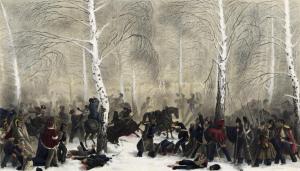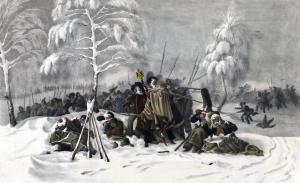Again, we have more accounts contributed by James Fisher. He has done an excellent job of painting the picture of the problems with the bridges and the difficulty in organizing the crossing. But there is also an unexpected event: Amid the chaos, a baby is born and who actually survives the retreat.
—
(Early morning 27th November) More running repairs
“At two in the morning, on the 27th, the three trestles of the same bridge [as the previous evening] broke down, in the deepest part of the river. General [Jean Baptiste] Eblé had been wise and prudent enough to ensure that the second half of the pontonniers had some rest. They were now employed in repairing this further mishap. The work was being carried out with great eagerness, when General [Jacques] Lauriston appeared on the bridge and showed natural impatience; he complained of the slowness of the work. This, however, could not have been done more actively. He described vividly how worried Napoleon was.
As they were busy clearing the wood débris on the breaking spot, General Eblé himself stood watching the construction of the trestles with wood of his own choice. General Lauriston asked to be conducted to him and he remained with him until the three trestles were ready, and both together went on their way, forcing the mounting crowd to stand by. After four hours of intense activity, communication was restored at six in the morning.”
Anon (2010) Passage de la Beresina 26, 27, 28 et 29e Novembre 1812. First Published 1812. The Naval & Military Press Ltd., Uckfield, East Sussex. 32 pp.
(27th November) Main crossing of French-Allied Army
Most of what remained of the Grande Armée crossed to the western (right) bank of the river on 27th November. The crossing was reasonable orderly at first, but became increasingly clogged and disordered as the day went on, particularly as the stragglers began to arrive. Captain François Dumonceau of the 2nd Regiment of Chevau-légers lanciers (Red (Dutch) Lancers) noted:

Part of the Berezina Panorama
by Wojciech Kossak
“Most of our army corps had already crossed, and all the Imperial Guard, of which we were the last to turn up. Only part of their parks and horse teams still remained to follow with us, but the crowd of disbanded troops had arrived and created a block by flocking from all sides, infiltrating everywhere, congesting the ground over a considerable area and refusing to give way to us or to move aside to let us through. Detachments of pontonniers and gendarmerie, posted at various bridgeheads, struggled hard with the crowd to contain it and control its flow. This disordered multitude persisted in moving forward, and formed a confused tangle of men, horses and vehicles which increased in numbers all the time almost to suffocation-point, pushing up to the river where several were drowned—thus renewing in all their horror the appalling scenes of the various earlier passages, but this time on a much larger scale in relation to the extent of the ground…
 On reaching the bridge to which we had been directed, we began to dismount and cross one by one, leading our horses so as not to shake the bridge. It had no guard-rail, was almost at water-level, covered by a layer of manure, and was already seriously damaged, dislocated, sagging in places, and unsteady everywhere. Some pontonniers, up to their armpits in the water, were busy repairing it. Among them were a number of Dutchmen who welcomed us and did their best to facilitate our passage by throwing a broken cart into the river, several dead horses, and other debris of all kinds which blocked the bridge.”
On reaching the bridge to which we had been directed, we began to dismount and cross one by one, leading our horses so as not to shake the bridge. It had no guard-rail, was almost at water-level, covered by a layer of manure, and was already seriously damaged, dislocated, sagging in places, and unsteady everywhere. Some pontonniers, up to their armpits in the water, were busy repairing it. Among them were a number of Dutchmen who welcomed us and did their best to facilitate our passage by throwing a broken cart into the river, several dead horses, and other debris of all kinds which blocked the bridge.”
Brett-James, A (1966) 1812: Eyewitness Accounts of Napoleon’s Defeat in Russia, MacMillan and Company Limited, London. pp. 257–258.
(Night of 27th/28th November) Arrival of the stragglers
“Until the 27th in the evening, there had been no overcrowding, because isolated men had come up in small numbers only. They arrived in crowds during the night between the 27th and 28th, bringing with them a large number of carriages and horses. Their disorderly march caused such congestion that the bridges could only be reached with endless difficulty and grave danger. General Eblé, as well as other generals and officers tried again and again, but in vain, to re-establish order. Their troops having freed themselves from the yoke of discipline could not be mustered. They were thoroughly depressed and dominated by selfishness.”
Anon (2010) Passage de la Beresina 26, 27, 28 et 29e Novembre 1812. First Published 1812. The Naval & Military Press Ltd., Uckfield, East Sussex. 32 pp.
Arriving at the bridges, this mass of stragglers settled itself at bivouac on the left bank of the river. Marbot was appalled at the lack of action by generals and staff in effecting a crossing on the night of 27th November.

At the Berezina
an unfinished painting
by Vasily Vereshagin
“…much has been said of the disasters which took place at the Berezina but what has never yet been said is, that the greater part of them might have been saved if the headquarters staff had understood its duties better, and taken advantage of the night of 28th November [27th-28th November] to get all the baggage and, still more, the thousands of straggles who next day blocked the way across the bridges.”
Mikaberidze, A (2010) The Battle of the Berezina: Napoleon’s Great Escape. Campaign Chronicles (Ed. C Summerville). Pen & Sword Books Limited, Barnsley, South Yorkshire, UK. pp. 156–157
(Night of 27th November) New life
New life was coming into the world, amidst all the death and suffering. Louise, a pregnant cantinière gave birth that night. Sergeant Bertrand describes:
 “The entire regiment was deeply moved and did what it could to assist this unfortunate woman who was without food and without shelter under this sky of ice. Our Colonel Romme set the example. Our surgeons, who had none of their ambulance equipment, abandoned in Smolensk for lack of horses, were given shirts, kerchiefs and anything people could come up with. I had noticed Marshal Victor’s artillery park not far away and ran over to it, purloining a blanket thrown over the back of one of the horses. I rushed back as fast as I could to bring it to Louise. I had committed a sin, but I knew God would forgive me on account of my motive. I got there just at the moment when our cantinière was bringing into the world, under an old oak tree, a healthy male child, whom I was to encounter in 1818 as a child soldier in the Legion of Aube.”
“The entire regiment was deeply moved and did what it could to assist this unfortunate woman who was without food and without shelter under this sky of ice. Our Colonel Romme set the example. Our surgeons, who had none of their ambulance equipment, abandoned in Smolensk for lack of horses, were given shirts, kerchiefs and anything people could come up with. I had noticed Marshal Victor’s artillery park not far away and ran over to it, purloining a blanket thrown over the back of one of the horses. I rushed back as fast as I could to bring it to Louise. I had committed a sin, but I knew God would forgive me on account of my motive. I got there just at the moment when our cantinière was bringing into the world, under an old oak tree, a healthy male child, whom I was to encounter in 1818 as a child soldier in the Legion of Aube.”
Mikaberidze, A (2010) The Battle of the Berezina: Napoleon’s Great Escape. Campaign Chronicles (Ed. C Summerville). Pen & Sword Books Limited, Barnsley, South Yorkshire, UK. pp. 157–158
Sources:
Anon (2010) Passage de la Beresina 26, 27, 28 et 29e Novembre 1812. First Published 1812. The Naval & Military Press Ltd., Uckfield, East Sussex. 32 pp.
Brett-James, A (1966) 1812: Eyewitness Accounts of Napoleon’s Defeat in Russia. MacMillan and Company Limited, London. 312 pp.
Mikaberidze, A (2010) The Battle of the Berezina: Napoleon’s Great Escape. Campaign Chronicles (Ed. C Summerville). Pen & Sword Books Limited, Barnsley, South Yorkshire, UK. 284 pp.
Mikaberidze, A (2012) Russian Eyewitness Accounts of the Campaign of 1812. Frontline Books (an imprint of Pen & Sword Books Ltd), Barnsley, South Yorkshire, UK. 261 pp.








